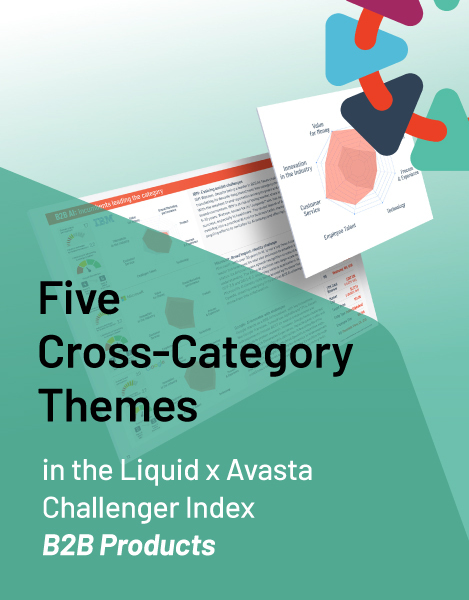Cybersecurity: Three challengers emerge amid widespread brand recall weakness

Navigating complexity
With over 7,000 confirmed category buyers, the latest Liquid x Avasta Challenger Index, B2B Products, has set out to determine which challenger brands are poised for future success in product categories including business intelligence, B2B AI, CRM, cybersecurity, database management and marketing automation.
When it comes to one specific category, navigating the complex landscape—which spans legacy manufacturers like Cisco to software-centric and service-integrated giants like CrowdStrike—has proved to be a challenge. One thing is clear: Brand recall is weak in the world of cybersecurity.
Convoluted brand portfolios and a muddied landscape
Of the 800+ distinct product and corporate brand names explored, over 50 cybersecurity companies received mention as a challenger or potential challenger. The landscape is cluttered with brands fighting to be on the radar of lead providers, who cast companies in the role of complementary point solutions, ensuring that best-in-breed status doesn’t necessarily equate to better sales performance.
Cybersecurity is marred by ambiguous naming, a lack of precision in the christening of new products and convoluted brand portfolios—all of which increase the crowdedness of the category, complicating brand recall and muddying decision making.
Conspicuous absences in the report
Despite the praise of analysts and industry “experts,” what became apparent in our research was the disconnect between those who are deemed challengers by the industry and the companies who were mentioned (or not mentioned) by customers in the space.
Microsoft Security, despite revenue surpassing $20B, received minimal attention, thereby excluding it entirely from the index. keeping it out of the index altogether. Furthermore, companies like Juniper Networks, Kaspersky and Barracuda were hardly mentioned, if at all, which raises the question of what is to come in the next decade with brand recall so low.
Rising contenders: Sophos, Trellix and CrowdStrike
While the landscape was complex with over 10 brands who made a claim to challenger positions in the index, Sophos, Trellix and CrowdStrike were chosen, as they have established a unique position.
Sophos’ deep-rooted expertise and brand trust
Founded in 1985 and headquartered in the UK, Sophos has been a trailblazer since the start of cybersecurity as a B2B product. Sophos’ calling card is its managed detection and response (MDR), which leverages its leaders’ expertise and confidence for “complete security without complexity.” Their innovations turn complicated problems into simple solutions.
In terms of base metrics, Sophos doesn’t necessarily jump off the charts. It’s a private company with 4,519 employees and an estimated trailing 12-month (TTM) revenue of $500M–$1B. However, what Sophos does have going for it that our other top challengers don’t is historical brand trust. Throughout its 50,000+ partner relationships, Sophos has developed and maintained a strong base of brand devotees who do more for its reputation than (just) marketing ever could.
Trellix’s remarkable rebirth and innovation
Trellix was born out of the 2022 merger between McAfee and FireEye. The latter brand, founded in 2004, was plagued with controversy after a 2020 hacking attack that raised questions about its security capabilities. But Trellix emerged out of that fire like a phoenix, ready to ascend.
And that it did—Trellix’s estimated TTM revenue for 2022 was over $1B, generated by serving over 40,000 customers (including 50% of the Fortune 500 list) with a staff of about 5,000.
The reason Trellix was able to command such a dominant position so quickly is that it executed a clean break from its former self. The brand has been able to leverage all the benefits of its legacy compatibility and the brand trust FireEye had generated, while simultaneously shaking off the negatives associated with the security breach. Its “living security” model applies to both its product offerings and its brand strategy, doubling down on growth and responsiveness.
Spotlight: Trellix and Sophos’ different approaches
Trellix and Sophos offer two opposed visions of what powers reliable, efficient cybersecurity products. Whereas Sophos’ brand and product offerings emphasize steady, principled solutions, Trellix instead leverages wisdom for flexible and dynamic innovation.
Taking things a step further, Sophos’ more traditional approach to security through unified suites makes its offerings more akin to an incumbent like Cisco. This is one line of defense against other challengers and incumbents alike. Trellix’s more adaptable model is less an emulation of prior success than a prescription for what the cybersecurity industry could be.
CrowdStrike’s proficiency and brand confidence
CrowdStrike was founded in 2011 and went public in 2019. Riding a wave of success punctuated by its navigation of the 2016 DNC hacking incident, CrowdStrike has established itself as ready and willing to take on the biggest cybersecurity challenges, on the biggest stages, efficiently.
Of the three top contenders, CrowdStrike has arguably the best shot at taking over soonest. It’s the only public company in this group, with a market cap of $50.15B—higher than one of our identified incumbents, Fortinet, at $41.27B. CrowdStrike also featured a much higher TTM revenue ($2.46B) than either Sophos or Trellix, driven by its many more employees (7,586).
What sets CrowdStrike apart, alongside its proven track record, is its clear and unequivocal sense of identity. Direct messaging such as “We Stop Breaches” connotes conviction, and the brand’s eclectic aesthetic choices (taking cues from gaming and animal imagery) belie its top-notch credentials and financial savvy. This is a brand that knows it’s poised to win.
How contenders in cybersecurity stack up to other B2B product challengers
As noted above, cybersecurity features a somewhat fractured challenger landscape relative to the other industry categories we surveyed. However, this does not mean that its contenders are any less likely than those in other verticals to succeed. Two of the three incumbents (Cisco and Palo Alto) are likely to consolidate into one, and buyers lack confidence that the other (Fortinet) will remain dominant in the next five to 10 years. The conditions are right for a challenger takeover.
If it does happen, we’re confident that Sophos, Trellix and/or CrowdStrike will lead the charge into a new era of cybersecurity B2B products. If you want to learn more about why these brands in particular are so well positioned, download the Liquid x Avasta Challenger Index | B2B Products here.

